Otocinclus is one of the best algae eaters suitable for fish tanks. Otocinclus tank mates need to be low-aggression because otocinclus are peaceful fish and they love staying with low-aggressive tank mates.
Corydoras are the best suitable tank mates for otocinclus fish. Fish may have different aggression types such as territorial, low aggression, and high aggression fishes. Territorial aggression is the main problem of the fish tank because when a fish enters the territory of another fish. The aggressive fish may start attacking other fish according to size and temperament.
In this article, you will know the best otocinclus tank mates and their information such as common name, family, temperament, and the reason for choosing the tank mates for otocinclus.
Can Otocinclus Live With Other Fish
Otocinclus is a herbivorous fish that can live with other fishes. Otocinclus are mainly used for reducing the growth of algae in the fish tank. Otocinclus are peaceful fish that stay more time on the leaves of plants and eat small bacteria and algae.
You need to keep the otocinclus with low aggression tank mates because aggressive fishes will attack the otocinclus fish which causes body damage and health issues. To improve the health and immunity system of otocinclus, you need to choose fish that are suitable for otocinclus water parameters.
Below is the list of fish suitable for an otocinclus tank.
11 Best Otocinclus Tank Mates
There are 11 different types of otocinclus tank mates with their aggression levels and basic information. In this section, I’ll provide information about each fish and with reason for choosing them.
- Clown Pleco
- Corydoras
- Rasboras
- Neon tetras
- Mollies
- Mystery Snails
- Guppies
- Nerite Snails
- Hillstream Loaches
- Endler Livebearers
- Khuli Loaches
Clown Pleco
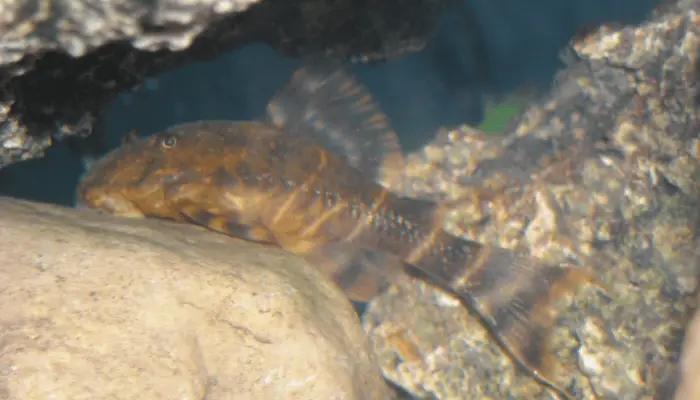
| Common Name | Clown Pleco |
| Scientific Name | Panaqolus maccus |
| Family | Loricariidae (Loricariid catfish family) |
| Origin | South America, specifically the Orinoco River |
| Size | 3 to 4 inches (7.5 to 10 cm) |
| Lifespan | 10 to 15 years |
| Aquarium Size | Minimum 20 gallons (75 liters) for one specimen |
| Water Parameters | – Temperature: 75-82°F (24-28°C) |
| – pH Level: 6.5-7.5 | |
| – Water Hardness: 5-15 dGH (soft to moderately hard) | |
| Temperament | Low-aggression Fish |
Clown plecos is a type of catfish suitable for all tanks. They are mainly used for cleaning the bottom and they are known as the bottom dwellers. The reason for choosing the clown plecos is low aggression fish, clean the fish tank. Clown pleco is a suitable otocinclus tank mate with the same water parameters.
Corydoras

| Common Name | Corydoras Catfish |
| Scientific Name | Corydoras spp. (Various species) |
| Family | Callichthyidae (Armored catfish family) |
| Origin | South America, mainly the Amazon Basin and Orinoco River |
| Size | Typically 2 to 4 inches (5 to 10 cm) |
| Lifespan | 5 to 10 years, depending on species and care |
| Aquarium Size | Minimum 10 gallons (38 liters) for a small group |
| Water Parameters | – Temperature: 72-78°F (22-26°C) |
| – pH Level: 6.0-7.5 | |
| – Water Hardness: 2-15 dGH (soft to moderately hard) | |
| Temperament | Low-aggression fish |
Corydoras is a type of catfish suitable for all tanks. The corydoras will eat uneaten food waste from the bottom of the tank and help to improve the quality of water. Corydoras are suitable for otocinclus because corydoras are low-aggression fish with similar water parameters.
Rasboras
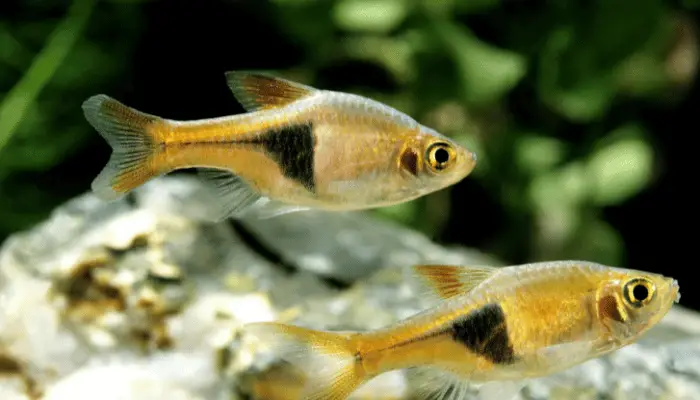
| Common Name | Rasboras |
| Scientific Name | Various species, including Boraras and Trigonostigma genera |
| Family | Cyprinidae (Cyprinid family) |
| Origin | Southeast Asia, including Thailand, Malaysia, Indonesia, and surrounding regions |
| Size | Typically 1 to 2 inches (2.5 to 5 cm) |
| Lifespan | 3 to 5 years, depending on species and care |
| Aquarium Size | Minimum 10 gallons (38 liters) for a small group |
| Water Parameters | – Temperature: 72-78°F (22-26°C) |
| – pH Level: 6.0-7.5 | |
| – Water Hardness: 2-10 dGH (soft to slightly hard) | |
| Temperament | Low aggression and peaceful fish |
Rasboras is a freshwater fish similar to goldfish and koi. The rasboras are schooling fish with peaceful and low-aggression temperaments suitable for all tanks. Rasboras are suitable for otocinclus because they are low-aggressive fish with similar water parameters.
Neon tetras
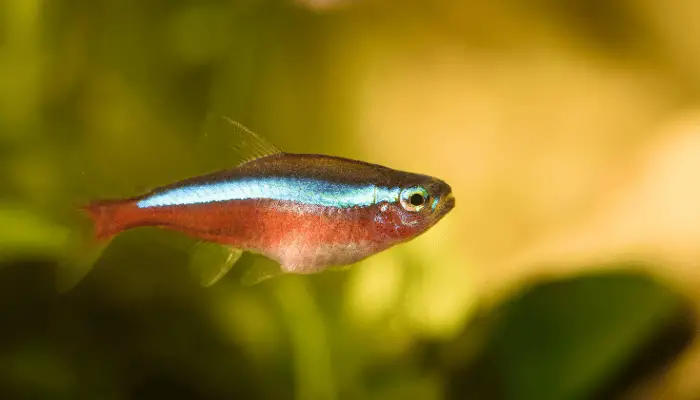
| Common Name | Neon Tetra |
| Scientific Name | Paracheirodon innesi |
| Family | Characidae (Characin family) |
| Origin | South America, mainly found in the Amazon Basin |
| Size | Typically 1 to 1.5 inches (2.5 to 4 cm) |
| Lifespan | 3 to 5 years |
| Aquarium Size | Minimum 10 gallons (38 liters) for a small school |
| Water Parameters | – Temperature: 72-78°F (22-26°C) |
| – pH Level: 6.0-7.0 | |
| – Water Hardness: 2-10 dGH (soft to slightly hard) | |
| Temperament | Low-aggression fish |
Neon tetra is a freshwater fish suitable for peaceful tanks. You need to keep them in groups of 6 and they need proper care because large fishes will attack them. You can keep neon tetras with otocinclus because they are both peaceful and low-aggressive fish with similar water parameters.
Mollies
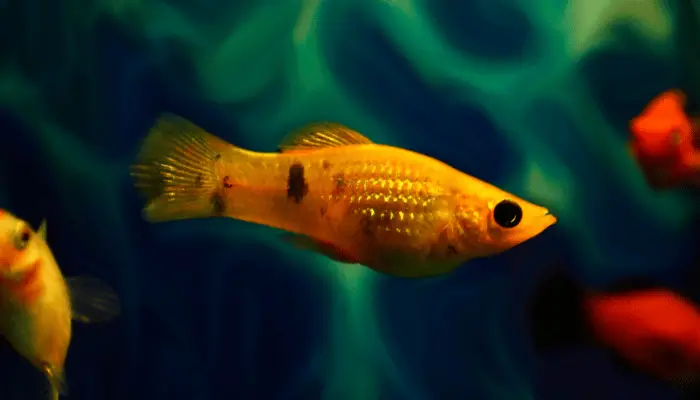
| Common Name | Mollies |
| Scientific Name | Poecilia spp. (Various species) |
| Family | Poeciliidae (Livebearer family) |
| Origin | Central and South America, primarily Mexico and surrounding areas |
| Size | Typically 2 to 4 inches (5 to 10 cm) |
| Lifespan | 3 to 5 years, depending on care and conditions |
| Aquarium Size | Minimum 20 gallons (75 liters) for a small group |
| Water Parameters | – Temperature: 75-82°F (24-28°C) |
| – pH Level: 7.0-8.5 | |
| – Water Hardness: 10-30 dGH (moderately hard to hard) | |
| Temperament | Peaceful fish but territorial |
Mollies are suitable for most of the tank. But they are territorial and need more space for swimming. Male fishes are territorial and aggressive temperament. Mollies are suitable for otocinclus tanks but need more space to live and mollies belong to the peaceful fish category. If you choose mollies as an otocinclus tank mate then you need to place hiding caves for otocinclus.
Mystery Snails
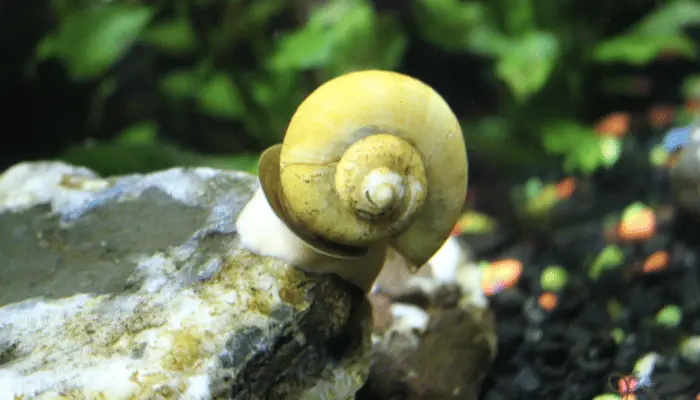
| Common Name | Mystery Snail (Pomacea bridgesii) |
| Scientific Name | Pomacea bridgesii |
| Family | Ampullariidae (Apple snail family) |
| Origin | South America, primarily found in the Amazon River Basin |
| Size | Typically 1 to 2 inches (2.5 to 5 cm) shell diameter |
| Lifespan | 1.5 to 3 years, depending on care and conditions |
| Aquarium Size | Minimum 5 gallons (19 liters) for one snail, larger for multiple snails |
| Water Parameters | – Temperature: 68-82°F (20-28°C) |
| – pH Level: 7.0-8.0 | |
| – Water Hardness: 5-15 dGH (soft to moderately hard) | |
| Temperament | Peaceful and low aggression |
Mystery snails are best for the tank because they will eat hair algae and clean the plants and decoration on the aquariums. Mystery snails are suitable for otocinclus tanks and they are peaceful fish and water parameters are similar to otocinclus.
Guppies
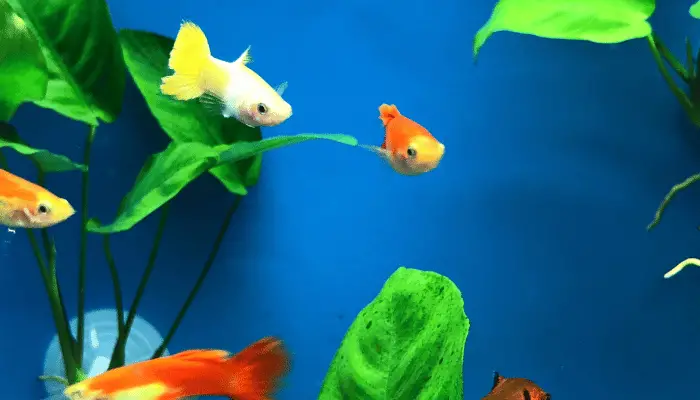
| Common Name | Guppies (Poecilia reticulata) |
| Scientific Name | Poecilia reticulata |
| Family | Poeciliidae (Livebearer family) |
| Origin | Native to freshwater streams in South America, primarily in Guyana, Venezuela, and Trinidad |
| Size | Typically 1.5 to 2.5 inches (3.8 to 6.4 cm) |
| Lifespan | 2 to 3 years, sometimes longer with optimal care |
| Aquarium Size | Minimum 10 gallons (38 liters) for a small group |
| Water Parameters | – Temperature: 72-82°F (22-28°C) |
| – pH Level: 6.8-7.8 | |
| – Water Hardness: 5-20 dGH (moderately hard to hard) | |
| Temperament | Peaceful and social fish with low aggression |
Guppies are suitable for any tank or outdoor ponds because they can thrive in any water condition and they need live plants for breeding and eat small bacteria. Guppies are suitable for otocinclus tanks because they are peaceful fish and water parameters are similar to otocinclus.
Nerite Snails
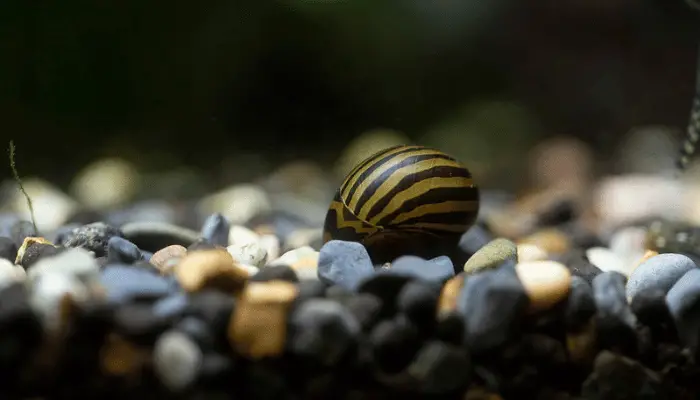
| Common Name | Nerite Snail (Neritina spp.) |
| Scientific Name | Various species within the Neritina genus |
| Family | Neritidae (Nerite snail family) |
| Origin | Found in both freshwater and brackish water habitats, including coastal regions in Asia, Africa, and the Americas |
| Size | Typically 0.5 to 1 inch (1.3 to 2.5 cm) |
| Lifespan | 1 to 2 years, depending on care and conditions |
| Aquarium Size | Suitable for various tank sizes, depending on the number of snails and tank conditions |
| Water Parameters | – Freshwater or brackish water, depending on the species |
| – Temperature: 72-78°F (22-26°C) for freshwater species | |
| – pH Level: 7.0-8.0 for freshwater species | |
| – Brackish water species require specific salinity levels (e.g., around 1.005-1.010 SG) | |
| Temperament | Peaceful and slow-moving |
Nerite snails are best for the fish tank because they will clean the glass and aquarium decoration. It was a suitable fish for otocinclus with a peaceful temperament and they are similar for eating algae and leftover foods and keeping the tank clean.
Hillstream Loaches
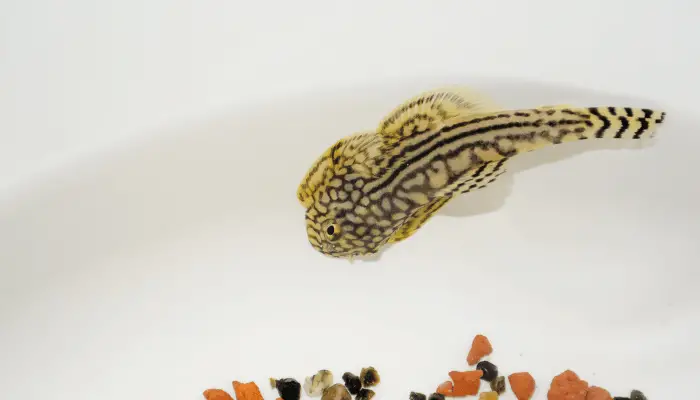
| Common Name | Hillstream Loach |
| Scientific Name | Various species within the Balitoridae family |
| Family | Balitoridae (Hillstream loach family) |
| Origin | Found in fast-flowing streams and rivers in Southeast Asia, including China, India, and Southeast Asian countries |
| Size | Typically 2 to 4 inches (5 to 10 cm) in length |
| Lifespan | 5 to 10 years, depending on care and species |
| Aquarium Size | Minimum 20 gallons (75 liters) for a small group |
| Water Parameters | – Temperature: 72-78°F (22-26°C) |
| – pH Level: 6.5-7.5 | |
| – Water Hardness: 5-15 dGH (soft to moderately hard) | |
| Temperament | Peaceful and Territorial |
Hillstream loaches are good for fish tank for cleaning the decorations and live plants. They are suitable for otocinclus tank mates because hillstream loaches are peaceful and the water parameters are similar to otocinclus fish. But hillstream loaches are territorial so they may attack otocinclus when they come near territory.
Endler Livebearers
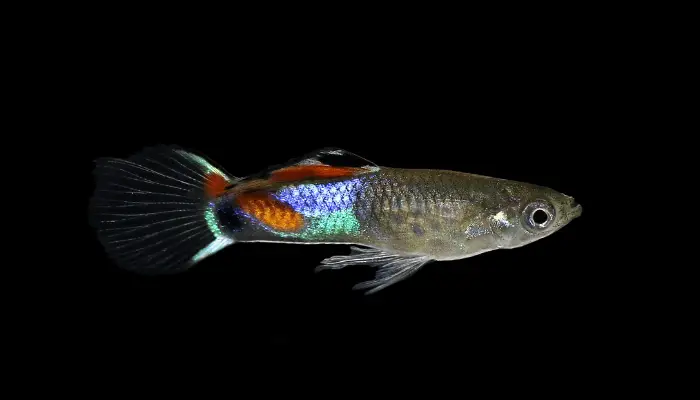
| Common Name | Endler Livebearers (Poecilia wingei) |
| Scientific Name | Poecilia wingei |
| Family | Poeciliidae (Livebearer family) |
| Origin | Northern Venezuela, particularly in the Laguna de Patos and its tributaries |
| Size | Typically 0.8 to 1.5 inches (2 to 3.8 cm) |
| Lifespan | 2 to 3 years, depending on care and conditions |
| Aquarium Size | Suitable for smaller tanks, as small as 5 gallons (19 liters) for a small group |
| Water Parameters | – Temperature: 72-78°F (22-26°C) |
| – pH Level: 6.5-8.0 | |
| – Water Hardness: 5-20 dGH (soft to moderately hard) | |
| Temperament | Peaceful and social |
Endlers Livebearers are suitable for otocinclus tank mates because they are peaceful and low aggression fish with similar water parameters.
Khuli Loaches
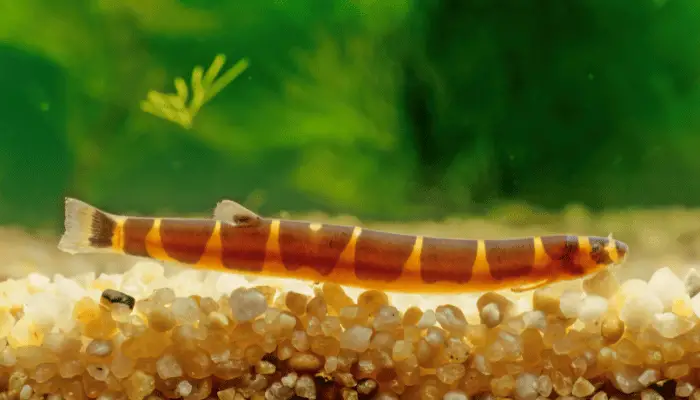
| Common Name | Kuhli Loach (Pangio kuhlii) |
| Scientific Name | Pangio kuhlii |
| Family | Cobitidae (Cobitid loach family) |
| Origin | Native to Southeast Asia, found in various countries including Malaysia, Indonesia, and Thailand |
| Size | Typically 3 to 5 inches (7.5 to 12.5 cm) |
| Lifespan | 8 to 12 years, depending on care and conditions |
| Aquarium Size | Minimum 20 gallons (75 liters) for a small group |
| Water Parameters | – Temperature: 75-86°F (24-30°C) |
| – pH Level: 5.5-6.5 | |
| – Water Hardness: 1-8 dGH (very soft to moderately hard) | |
| Temperament | Peaceful and low aggression |
Khuli loaches are peaceful and low aggression fish suitable for otocinclus tank mates with similar water parameters. They will clean the tank and liveplants for keep the water quality improved.
How do you choose tank mates based on the size of your aquarium?
You can choose the tank mates according to the size of the fish and tank. If the aquarium size is small then you can choose small size tank mates with peaceful and low aggression temperament. Don’t overstock the aquariums because the water becomes poor quality due to fish poops and uneaten foods.
While choosing the tank mates you need to select the tankmates with similar water parameters and temperament. Otherwise the fish have several health problems.
What are some common signs of compatibility issues in a community tank with Otocinclus?
The fish may show aggressive behavior towards other tank mates due to several reason such as chasing , nipping on fins etc. Otocinclus are peaceful fish and when other fish attack them the otocinclus becomes stressed and hiding near the caves or behind the plants.
Aggressive bahavior
- Chasing
- Nipping
- Territory entry
- Hiding
- Not eating food
What fish eats Otocinclus catfish?
Here is the list of fish that may eat otocinclus catfish.
- Oscars
- Jack Dempseys
- Redtail Catfish
- Tiger Shovelnose Catfish
- Pike Cichlids
- Arowanas
- Giant Gourami
- Buenos Aires Tetras
Can otocinclus live with goldfish?
Goldfish are peaceful and social fish that are suitable for all the fish tanks with small fish. Goldfish may become aggressive sometimes when they don’t get enough food. So they start attacking other small tankmates. Otocinclus are good for goldfish tanks because otocinclus will eat only algae wafers and algae etc.
Can Mollies live with otocinclus?
Mollies are peaceful and territory fish. Mollies may become aggressive when other fishes enter their territory. Otocinclus are peaceful fish and keeping the mollies with otocinclus is possible but you need to monitor the mollies’ behavior every day.
Can otos eat shrimp?
Otocinclus will not eat shrimp or any other fish. They will eat only algae, algae wafers and vegetables. Otocinclus are peaceful and low-aggression catfish so you can keep shrimps with otocinclus.
How many Ottos should you keep together?
You need to keep otocinclus in the group because they are schooling fish. You need to keep at least 6 otocinclus fishes as a group in a fish tank. You can increase the quantity of fish size according to the size of the aquariums.
Otocinclus are good for fish tanks because they will reduce the spreading of algae and clean the decorations and live plants.
Do otocinclus produce lots of waste?
Otocinclus will not produce a lot of waste like goldfish. You can keep a filtration system and regular water maintenance will improve the quality of water and reduce the physical and chemical substances in the fish tank.
Will otocinclus destroy plants?
Otocinclus will not destroy plants, but they may eat decade side of plants. Otocinclus will eat algae and clean the live plants leaves.
